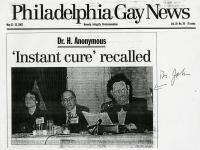Answer: Dr. John Ercel Fryer
John Fryer was born in Kentucky in the 1930s. He attended Transylvania College in Lexington, Kentucky, graduating in 1957, and was later accepted in Vanderbilt University's Medical School. Fryer did his medical residency at the Ohio State Hospital and, being forced to leave the psychiatry residency program at University of Pennsylvania after it was discovered that he was gay, completed his psychiatry residency at Norristown State Hospital in Philadelphia. After his residency Dr. Fryer stayed in Philadelphia, joined Temple University’s faculty, obtained tenure and full professorships in psychiatry and family and community medicine, and taught for more than thirty years until his retirement in 2000. He also established a private practice at his home office, offering both individual and group therapy, mostly to gay men and lesbians, persons with alcohol and drug addictions, patients with AIDS/HIV, and people coping with death.
In 1964 Dr. Franklin E. Kameny publicly criticized the listing of homosexuality as a disease or pathology in medical literature and in 1971 Kameny and other gay activists confronted psychiatrists attending the annual convention of the APA. As a result of this incident Kameny and Barbara Gittings, another well-known gay advocate, were invited to the 1972 meeting of the APA to make a presentation to help educate their members about homosexuality. Originally a panel composed of Kameny, Gittings and two psychiatrists, Gittings felt that what they needed was a person both a psychiatrist and gay. After making inquiries among people they knew, Fryer accepted on the condition of keeping his participation anonymous.Fryer called himself "Dr. Henry Anonymous" and wore a baggy suit, a mask, and used a microphone that distorted his voice. Starting his speech with the words “I am a homosexual. I am a psychiatrist,” Fryer electrified an audience that found itself listening to a gay psychiatrist speak in a public forum for the first time. Fryer’s appearance had a galvanizing effect, playing a crucial role in prompting the APA in 1973 to remove homosexuality from its lists of mental disorders. Fryer did not reveal he was the man behind the mask until the 1994 APA annual meeting in Philadelphia. In recognition, the Association of Gay and Lesbian Psychiatrists (AGLP) honored Fryer with its Distinguished Service Award in 2002.
The John Fryer collection at HSP [#3465]contains his personal and professional papers spanning from his early teens to 2003, the year he died. The collection is divided into five series and includes correspondence, postcards, handwritten notes, concert programs, periodical, subject files, photographs, and many other materials.

